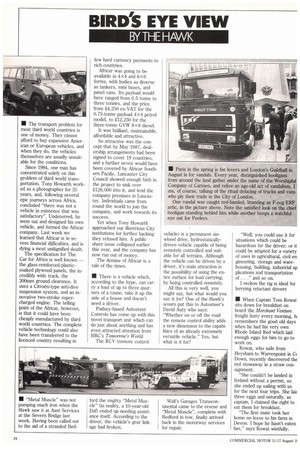• The transport problem for most third world countries is
Page 22

If you've noticed an error in this article please click here to report it so we can fix it.
one of money. They cannot afford to buy expensive American or European vehicles, and when they do, the vehicles themselves are usually unsuitable for the conditions.
Since 1984, one man has concentrated solely on this problem of third world transportation. Tony Howarth worked as a photographer for 25 years, and, following several epic journeys across Africa, concluded "there was not a vehicle in existence that was satisfactory". Undeterred, he went out and designed his own vehicle, and formed the Africar company. Last week we learned that Africar is in severe financial difficulties, and is dying a most undignified death.
The specification for The Car for Africa is well known — the glass-reinforced-plasticsoaked plywood panels, the incredibly wide track, the 300mm ground clearance. It uses a Citroen-type anti-dive suspension system, and an innovative two-stroke supercharged engine. The telling point of the Africar, however, is that it could have been cheaply manufactured by third world countries. The complete vehicle technology could also have been transferred to the licenced country resulting in few hard currency payments to rich countries.
Africar was going to be available in 4x4 and 6 x 6 forms, with bodies as diverse as tankers, mini buses, and panel vans. Its payload would have ranged from 0.5 tonne to three tonnes, and the price from £4,250 ex-VAT for the 0.75-tonne payload 4 x4 petrol model, to £12,250 for the three-tonne GVW 8x8 diesel.
It was brilliant, maintainable, affordable and attractive.
So attractive was the concept that by May 1987, dealership arrangements had been signed to cover 19 countries, and a further seven would have been covered by Africar Southern Pacific. Lancaster City Council showed enough faith in the project to sink over £120,000 into it, and lend the company premises in Lancaster. Individuals came from round the world to join the company, and work towards its success.
Yet when Tony Howarth approached our illustrious City institutions for further backing they refused him. A public share issue collapsed earlier this year, and the company has now run out of money.
The demise of Africar is a tale of the times.
• There is a vehicle which, according to the hype, can carry a load of up to three quarters of a tonne, take it up the side of a house and doesn't need a driver.
Pudsey-based Autosteer Controls has come up with this novel transport unit which can do just about anything and has even attracted attention from BBC's Tomorrow's World.
The RCV (remote control vehicle) is a permanent sixwheel drive, hydrostaticallydriven vehicle capable of being remotely controlled and suitable for all terrains. Although the vehicle can be driven by a driver, it's main attraction is the possibility of using the entire surface for load carrying, by toeing controlled remotely.
All this is very well, you might say, but what would you use it for? One of the Hawk's scouts put this to Autosteer's David Auty who says: "Whether on or off the road the remote control ability adds a new dimension to the capabilities of an already extremely versatile vehicle." Yes, but what is it for? "Well, you could use it for situations which could be hazardous for the driver; or it could be adapted for a variety of uses in agricultural, civil en gineering, storage and warehousing, building, industrial ap plications and transportation of. ." and so on.
I reckon the rig is ideal for ferrying reluctant drivers
• When Captain Tom Rowat sits down for breakfast on board the Merchant Venture freight ferry every morning, tb remembers the good old days when he had his very own Rhode Island Red which laid enough eggs for him to go to work on.
Rowat, who sails from Heysham to Warrenpoint in Cc Down, recently discovered the red stowaway in a straw consignment.
"She couldn't be landed in Ireland without a permit, so she ended up sailing with us for the next four trips. She laic three eggs and naturally, as captain, I claimed the right to eat them for breakfast.
"The first mate took her home on leave to his farm in Devon. I hope he hasn't eaten her," says Rowat wistfully.












































